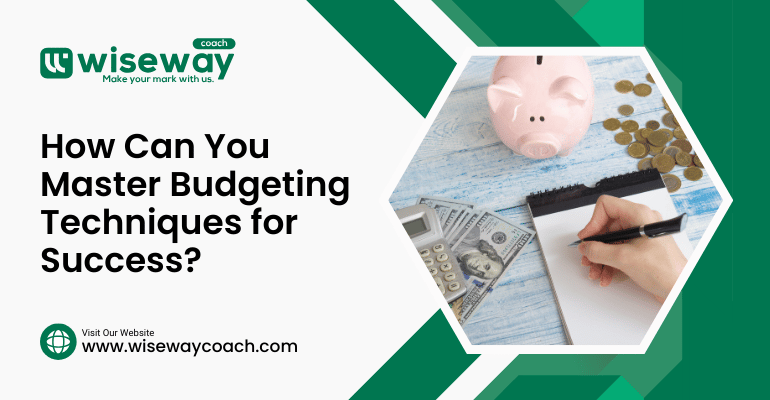How Can You Master Budgeting Techniques for Success?
September 11, 2024 2024-09-11 9:50How Can You Master Budgeting Techniques for Success?
Mastering budgeting techniques is a fundamental step toward achieving financial success. A well-crafted budget provides a clear picture of your income and expenses, helping you manage your money more effectively and reach your financial goals. Here’s a comprehensive guide to mastering budgeting techniques that can set you up for long-term financial success.
1. Understand Your Income and Expenses
Track Your Income
The first step in mastering budgeting is to get a clear understanding of your income. This includes not only your regular salary but also any additional sources of income such as freelance work, rental income, or dividends. Knowing your total income is crucial for setting realistic spending limits.
Categorize Your Expenses
Next, categorize your expenses into fixed and variable costs. Fixed expenses are regular payments that do not change, such as rent or mortgage, insurance premiums, and loan payments. Variable expenses include groceries, dining out, entertainment, and other discretionary spending. Breaking down your expenses helps you see where your money is going and identify areas where you can adjust.
2. Create a Realistic Budget
Set Financial Goals
Before creating a budget, set clear financial goals. These might include saving for a vacation, building an emergency fund, paying off debt, or investing for the future. Defining your goals will help you allocate your resources effectively and stay motivated to stick to your budget.
Use the 50/30/20 Rule
One popular budgeting method is the 50/30/20 rule. Allocate 50% of your income to necessities (e.g., housing, utilities), 30% to discretionary expenses (e.g., entertainment, dining out), and 20% to savings and debt repayment. This rule provides a simple framework for managing your finances and ensuring that you cover essential expenses while saving for the future.
3. Implement Budgeting Tools
Use Budgeting Apps
Leverage technology to make budgeting easier. There are numerous budgeting apps available that can help you track your income, categorize expenses, and analyze spending patterns. Apps like Mint, YNAB (You Need A Budget), and PocketGuard offer features to simplify budgeting and provide insights into your financial habits.
Spreadsheets and Templates
If you prefer a more hands-on approach, consider using spreadsheets or budget templates. These tools allow you to customize your budget according to your specific needs and track your progress over time. Many free templates are available online, or you can create your own based on your income and expense categories.
4. Monitor and Adjust Your Budget
Track Your Spending
Regularly monitor your spending to ensure you’re staying within your budget. Review your transactions and compare them with your budgeted amounts. Many budgeting apps automatically categorize and track your spending, making it easier to stay on top of your finances.
Adjust as Needed
Your financial situation may change, requiring adjustments to your budget. If you experience an increase in income or unexpected expenses, revise your budget to reflect these changes. Periodic reviews and adjustments help you stay aligned with your financial goals and manage any financial challenges effectively.
5. Develop Good Financial Habits
Avoid Impulse Spending
Impulse spending can derail even the best budget. Develop strategies to avoid impulse purchases, such as creating a shopping list before heading to the store or implementing a 24-hour rule before making non-essential purchases. This can help you stick to your budget and make more thoughtful spending decisions.
Build an Emergency Fund
An emergency fund is a crucial component of financial stability. Aim to set aside three to six months’ worth of living expenses in a separate savings account. This fund acts as a financial buffer against unexpected expenses, such as medical emergencies or car repairs, and helps you avoid going into debt.
6. Plan for Irregular Expenses
Anticipate Seasonal Costs
Some expenses, such as holiday gifts, vacations, or annual subscriptions, occur irregularly. Plan for these costs by setting aside a portion of your income each month. Create a sinking fund to save for these anticipated expenses, ensuring you’re prepared when they arise.
Review and Update Your Budget
Regularly review your budget to account for any changes in your financial situation or goals. This could include adjusting for changes in income, new expenses, or changes in financial priorities. Keeping your budget up to date ensures it remains relevant and effective in helping you achieve your financial objectives.
7. Seek Professional Advice
Financial Advisors
If you find budgeting challenging or need assistance with financial planning, consider seeking advice from a financial advisor. Professionals can provide personalized guidance, help you create a comprehensive budget, and offer strategies for managing your money more effectively.
Financial Workshops and Seminars
Participating in financial workshops or seminars can also enhance your budgeting skills. These events provide valuable information and tips on managing personal finances, budgeting, and achieving financial goals.
Conclusion
Mastering budgeting techniques is essential for achieving financial success and stability. By understanding your income and expenses, creating a realistic budget, using budgeting tools, monitoring and adjusting your budget, developing good financial habits, planning for irregular expenses, and seeking professional advice, you can take control of your finances and work toward your financial goals. Remember, effective budgeting is an ongoing process that requires regular attention and adjustment, but the rewards of financial security and success are well worth the effort.

